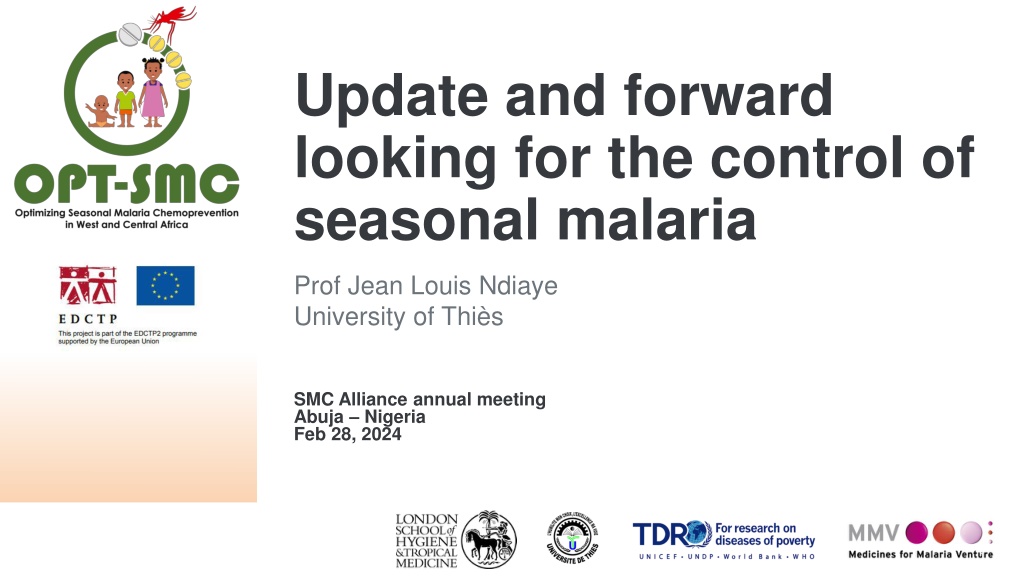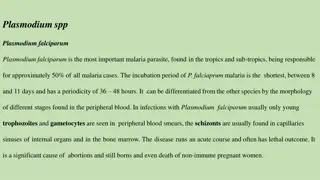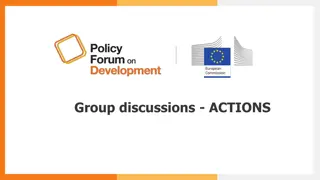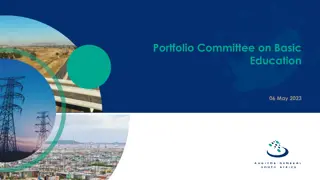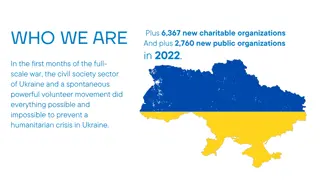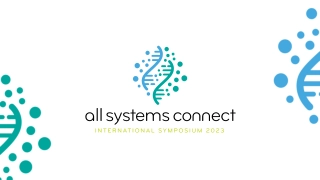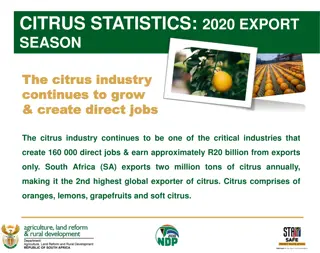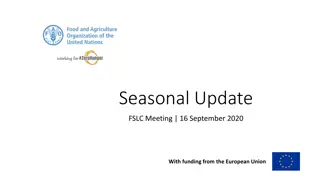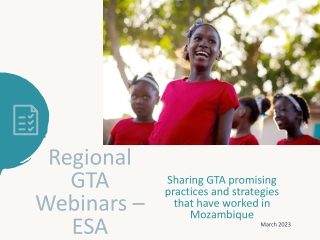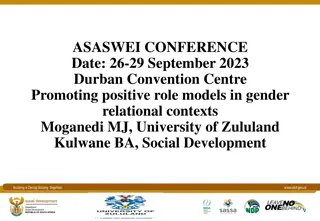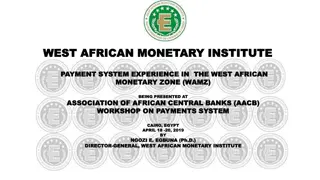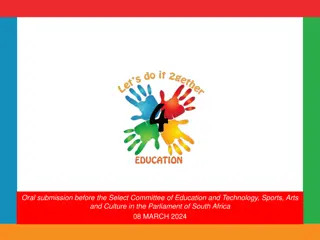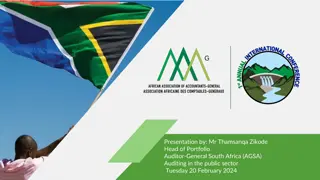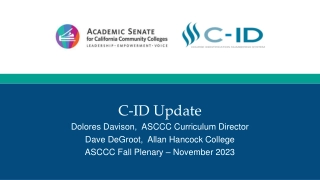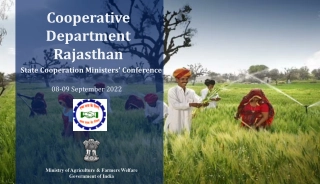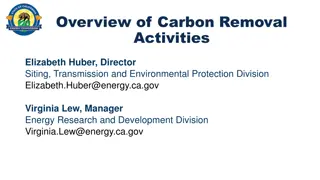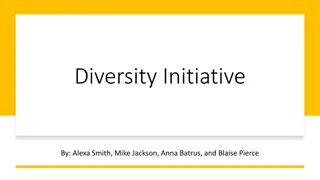Strengthening Seasonal Malaria Control Initiatives in West Africa
Prof. Jean Louis Ndiaye leads a collaborative effort involving NMPs from various countries to optimize the effectiveness of Seasonal Malaria Chemoprevention (SMC). The project aims to enhance research priorities, conduct IR/OR projects, and promote inter-country collaboration to combat malaria in the region. Detailed project timelines and operational activities are outlined for improved SMC implementation.
Download Presentation
Please find below an Image/Link to download the presentation.
The content on the website is provided AS IS for your information and personal use only. It may not be sold, licensed, or shared on other websites without obtaining consent from the author. Download presentation by click this link. If you encounter any issues during the download, it is possible that the publisher has removed the file from their server.
Presentation Transcript
Update and forward looking for the control of seasonal malaria Prof Jean Louis Ndiaye University of Thi s SMC Alliance annual meeting Abuja Nigeria Feb 28, 2024 1
Project team and locations NMPs from Benin, Burkina Faso, Cameroon, Chad, The Gambia, Ghana, Guinea, Guinea Bissau, Mali, Niger, Nigeria, Togo and Senegal University of Thies : Jean Louis Ndiaye, Ibrahima Mbaye, Fatimatou Bintou Sall, Amadou Seck, Ndeye Fatou Diop LSHTM: Paul Milligan, Susana Scott, Lucy Bell WHO/TDR : Corinne Merle MMV : Andre Tchouatieu, Abena Poku- Awuku
Objectives of OPT-SMC Strengthening the capacities of the NMPs implementing SMC: - To define research priorities for optimizing SMC effectiveness - To conduct IR/OR projects for improving SMC effectiveness: - interpret and make use of malaria surveillance data - target effectively (high risk populations and periods of the year) - monitor delivery, uptake and effectiveness Promote inter-country collaboration, sharing of information and expertise
Project Timelines Project starts Project ends Operational/Implementation research, mentoring and technical assistance WS1: WS3: Introduction of the RTS,S/S (virtual) Development research plans May 2020 WS2: Training on qualitative research WS5:implementation strategies for the RTS,S introduction WS4: Research training Module 1 (virtual) WS6 : Data analysis, data interpretation WS7: Dissemination * Baseline needs assessment Coverage survey** Coverage survey** Coverage survey** Coverage survey** Coverage survey** SMC SMC SMC SMC SMC SMC campaigns: Jul-Nov campaigns: Jul-Nov campaigns: Jul-Nov campaigns: Jul-Nov campaigns: Jul-Nov campaigns: Jul-Nov M J J A S O N D J F M A M J J A S O N D J F M A M J J A S O N D J F M A M J J A S O N D J F M A M J J A S O N D J F M A 2025 2022 2024 2020 2021 2023 No cost extension *Workshop dates subject to change ** no specific funding for supporting coverage surveys but through OPT-SMC technical support could be provided for good quality surveys and additional sub-studies for understanding the variation of the coverage.
NMCP projects: Barriers to uptake: Qualitative studies Developing New Strategies Monitor and Evaluate Adapting target groups Ghana: SMC coverage and factors associated with uptake and adherence Guinea: Barriers to SMC uptake in mining areas in Guinea and an improved delivery approach. Niger: Applying the updated WHO SMC guidelines in Niger: timing and number of cycles, and age ranges at risk of severe malaria ongoing Mali : Evaluation of SMC using 3 approaches: DOT 3, SMC plus and Classic Benin: Monitoring the effectiveness of SMC in northern Benin using the case-control method. Nigeria: Barriers and facilitators of SMC uptake in Nigeria: a qualitative study in 5 States. Cameroon: Effectiveness of using household leaders to improve adherence during SMC Togo: Defining optimal SMC strategies in Togo: timing and number of cycles, and age ranges at risk of severe malaria ongoing Senegal: Estimating the delivery costs and cost effectiveness of SMC in southern Senegal Burkina Faso: Evaluating the determinants of variations in SMC coverage in Burkina Faso between urban and rural areas Senegal : Mechanistic Model for cost effective evaluation of SMC delivery Chad: Development stage The Gambia: Assessment of adherence to SMC in The Gambia Guinea Bissau: Strengthening health management information systems to assess the impact of SMC in three regions in Guinea Bissau
Project updates 13 countries: 3 - complete (Nigeria, Ghana and Guinea) 5 - data collection complete, analysis stage 2 - data collection ongoing 2 ethics approval, will start this year 1 still to confirm a project Conferences: ASTMH 2021 ( Ghana, COVID work and video job- aids) and 2022 (Guinea and Nigeria) EDCTP forum Nov 23, Paris (Guinea, Nigeria, Mali and Burkina Faso)
OPT SMC communication and visibility Two newsletters every year OPT-SMC Web page on the SMC Alliance Web site OPT-SMC project updates at the SMC Alliance annual meetings World Malaria Day social media activities OPT-SMC as part of 10 years anniversary of SMC OPT-SMC on the International Day of the African Child: https://healthpolicy- watch.news/97669-2/ OPT-SMC several webinars Organizing a webinar on SMC: https://echosante.info/zero-malaria-icf-supports- evidence-for-streamlining-smc-implementation/ Webinars on SMC and vaccines Meetings with NMPs representatives at ASTMH Development of OPT-SMC publication / Dissemination plan (2024) 7
Add on studies to support the project Standardised protocols for implementation research (WHO funded) WHO/GMP: collaboration to add SMC module onto the DHIS2 and train countries on how to use it to better interpret their data
Strengths Network of 13 countries sharing progress and lessons learnt 1 NMPs leading the research: Identifying priority questions / Conducting research an putting the findings into practice 2 Providing technical support and strengthening capacity in IR methods 3 Facilitating collaboration between NMPs and local research institutions / partners 4 Frequent communication with each NMP and bringing all partners together through regular webinars and in-person meetings 5 Bi-lingual project (sometimes tri) strong emphasis to be inclusive to all 6 9
Common themes that came out Mistrust : safety, suspicion about drugs provided free, not effective communication, distributors not from local community 1 2 Need to adapt delivery to local factors Importance of qualitative research to understand community perspectives and then take these into account when planning SMC delivery 3 4 Challenges of delivery in areas with security problems Implementing the recommendations from the various research might involve some additional cost 5 10
Forward look for the control of seasonal malaria A constant search for better SMC optimization 2018: WHO progress in malaria control had stalled importance of optimising the use of proven interventions OPT-SMC WHO 2022 guidelines on malaria Where should we do SMC? When to start? How many cycles? Age range? (High risk of severe disease) Need for improved surveillance data for severe disease and greater granularity New implementation field guide 11
Forward look for the control of seasonal malaria New interventions on the horizon in combination with SMC Malaria vaccine from 2024 Monoclonal antibodies? Long Acting Injectable antimalarials ? Similar implementation challenges to ensure that all children are reached Network approach of OPT-SMC maybe helpful 12
NMP: Benin, Burkina Faso, Cameroon, Chad, Ghana, Gambia, Guinea, Guinea Bissau, Mali, Niger, Nigeria, Senegal, Togo and Mauritania THANK YOU !!!! 13
